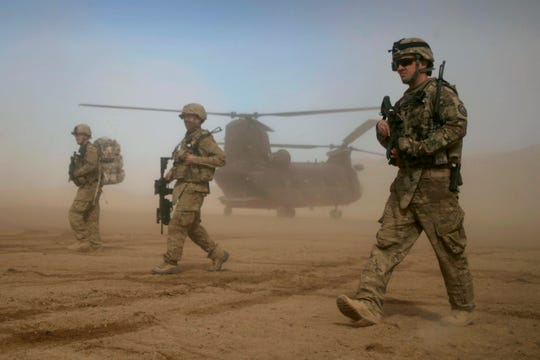Afghanistan withdrawal draws strong Capitol Hill reactions, making some strange alliances

President Joe Biden drew swift support and harsh warnings from politicians in both parties for his decision to withdraw U.S. troops from Afghanistan at the 20-year mark of that war.
Senate Minority Leader Mitch McConnell pulled no punches in responding to Biden’s decision to withdraw troops from Afghanistan in September.
“Precipitously withdrawing U.S. forces from Afghanistan is a grave mistake. It is retreat in the face of an enemy that has not yet been vanquished and abdication of American leadership,” McConnell said on the Senate floor Tuesday.
20-year war: ‘It is time to end America’s longest war’: Biden addresses Afghanistan withdrawal today
He added “a reckless pullback like this” leaves the region vulnerable in the “fight against terrorists that we have not yet won. It will also specifically abandon the women of Afghanistan, whose individual freedoms and human rights will be imperiled.”
Sen. Lindsey Graham shared a similar sentiment, calling the withdrawal “a disaster in the making” and “so irresponsible, it makes the Biden Administration policies at the border look sound.”
Rep. Liz Cheney, R-Wyo., whose father was vice president when the war began, called the Sept. 11 deadline “a huge propaganda victory for the Taliban, for al Qaeda.”
“Any withdrawal of forces that is not based on conditions on the ground puts American security at risk,” she said.
The Senate Foreign Relations Committee’s top Republican is against the move.
“This plan fails to guarantee America’s safety,” said U.S. Senator Jim Risch (R-Idaho), the panel’s ranking member, of the Senate Foreign Relations Committee. “A rushed and political decision to withdraw without consideration of our counterterrorism priorities will allow Afghanistan to serve as a future platform for terrorist attacks against the United States and our partners.”
But not all Republicans were with them.
Sen. Cynthia Lummis, R-Wyo., who tweeted on Wednesday: “I wish the Biden Administration had kept to President Trump’s May 1 deadline, but I am pleased our troops are coming home.” She added she looks forward to working with the White House “to continue our intelligence gathering efforts and preventing terrorists from using Afghanistan as a home base.”
Democrats are far from united on the topic, as well.
Senate Majority Leader Chuck Schumer, D-N.Y., told CNN on Wednesday the plan “is a very good one,” describing it as “thought-out.”
“You want to make sure that the September 11th date is stuck, is a date that sticks. That it’s not kicking the can down the road,” he said.
Sen. Bernie Sanders, I-Vt., praised the move and said the U.S. “must remain committed to diplomatic, economic and humanitarian support for Afghanistan even as we bring this military intervention to an end.”
“I applaud President Biden for making the brave and right decision to withdraw U.S. troops from Afghanistan and bring an end to the longest war in our country’s history.
FILE – In this Jan. 28, 2012 file photo, U.S. soldiers, part of the NATO- led International Security Assistance Force (ISAF) patrol west of Kabul, Afghanistan. After 20 years of military engagement and billions of dollars spent, NATO and the United States still grapple with the same, seemingly intractable conundrum — how to withdraw troops from Afghanistan without abandoning the country to even more mayhem. (AP Photo/Hoshang Hashimi, File) (Photo: Hoshang Hashimi, AP)
But just last month, some top Senate Democrats warned a hasty U.S. withdrawal would be a mistake.
“We’ve got to be able to assure the world and the American public that Afghanistan will not be a source of planning, plotting to project terrorist attacks around the globe,” Sen. Jack Reed, chairman of the Senate Armed Services Committee, told reporters during a recent video session hosted by George Washington University. “That’s the minimum. I’m not sure we can do that without some presence there.”
Though he has not yet commented on the Sept. 11 deadline, in March, Sen. Bob Menendez, D-N.J., Senate Foreign Affairs Committee chair, warned about the previous May 1 withdrawal timeline.
“The Taliban is clearly not abiding by all of its commitments under the Feb. 29 agreement, and it’s raising serious questions about the future of Afghan security and governance,” he told a small group of reporters during a roundtable. “No one wants to bring our sons and daughters home as much as I do. But I also don’t want to have shed so much blood and national treasure, and see it fall back into chaos.”
Source: Read Full Article

